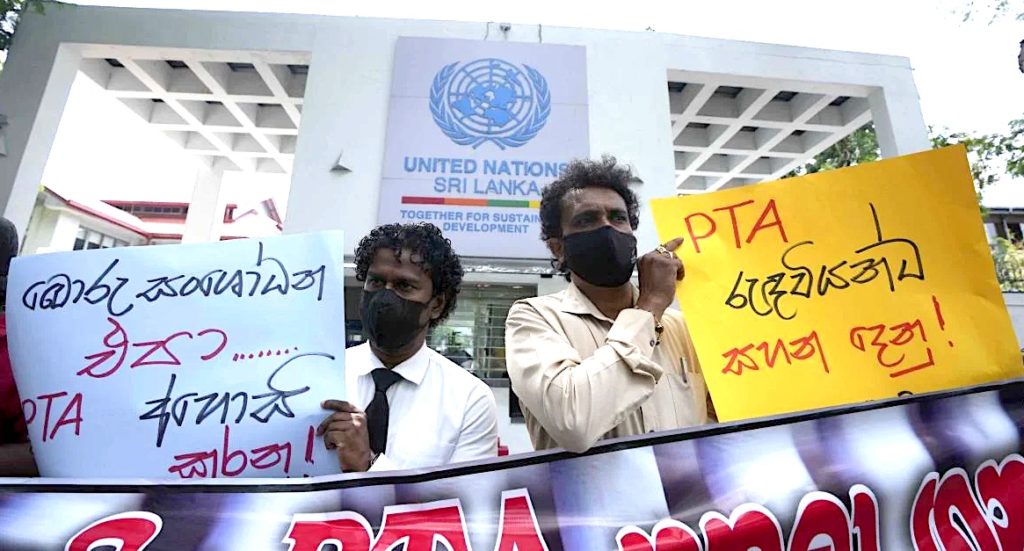Photo courtesy of Human Rights Watch
Counterterrorism and protecting human rights has been a long standing dichotomy on a global scale. The same fate was experienced in the Sri Lankan context with the civil war and internal insurrections. Among all counterterrorism measures, the Prevention of Terrorism Act (Temporary Provisions) (PTA) of No. 48 of 1979 has been the most debated. The PTA was enacted on July 15, 1979 as a temporary urgent bill. It was presented to the Parliament by President J.R. Jayewardene, debated and passed within one day. Although President Jayewardene presented the Bill to deal with terrorism in North, ironically first to be detained under the Act were two Sinhalese activists of the opposition. Thus since its enactment the PTA has had ulterior motives. All in all the PTA is yet another embodiment of horrors of undemocratic and unfettered executive powers. Despite several attempts to amend or repeal this draconian piece of legislation it has existed, causing grave human right violations in the country, particularly targeting minorities, political opponents, activists and journalists. Beyond such egregious and inhumane violations, the research has shown its larger impact on socio-economic conditions as well. The most recent attempt in answering constant international and domestic aversion to the Act has been the PTA Amendment Bill of 2022.
President Gotabaya Rajapaksa appointed a committee in June 2021 to make recommendations to the cabinet sub-committee to review the PTA. In the process of the committee deciding whether to amend the existing law or to draft a new legislation, they also looked at the Counter Terrorism Bill formulated under the previous government. Meanwhile in August 2021, the president appointed an Advisory board on the PTA to make recommendations and advise him. The first report of the committee was handed over to the president in November 2021 without taking measures to publicise it. The Bill was tabled in Parliament on February 10, 2022 amid heavy criticism of minority MPs and civil society activists. Furthemore it is evident that the government is attempting to pass a pretense legislation in haste to rescue GSP+ granted by the European Union (EU) and face UN Human Rights Council However, (un)fortunately after the bill was tabled the EU noted its concern over leaving out crucial amendments. The Human Rights Commission of Sri Lanka, despite stripping off its independence under the 20th Amendment, advocated for the repeal of the Act with the tabling of the Bill.
In analysing the provisions of the Bill it is apparent that many controversial and undemocratic provisions of the Act that led to serious human right violations have been left out and ignored. Firstly the Bill has completely refrained from addressing key provisions that outright violate the freedom from arbitrary arrest, detention and punishments and the right to a fair and due process. Under S. 16 of the PTA confessions and statements by suspects are made admissible in contrary to the requisites of the Evidence Ordinance. For example under the Evidence Ordinance confessions made to a police officer or while in police custody are inadmissible, however the PTA allows them. The Act further puts the burden of proof on the suspect to prove that a statement is obtained under inducement, threat or promise.
The Bill has not amended the initial period of 72 hours after arrest and before producing a suspect before a magistrate whereas under the general law, the maximum period in custody before being produced is 24 hours. However, the Bill has amended the S.9 of the PTA where the period of 18 months of detention without bail is now 12 months, has imposed a duty on Magistrate to visit the suspect and has made it a requisite to inform HRCSL on such detentions. While the latter amendments are commendable yet there is much space to progress such as making it mandatory for the Magistrate to direct the suspect to judicial medical officer and IGP if he or she is subjected to torture. Furthermore under the Bill the Minister can still decide the detention place of the suspect. The case studies have consistently shown how the freedom from torture has been inhumanely violated to obtain confessions while detaining suspects for longer periods of time, yet these provisions have not been answered adequately by the Bill.
There is no provision in the PTA to inform the suspects about their charges, causes and rights at the time of arrest. Although it is required under the general law the PTA has remained exceptional, and still remains so under the Bill. This is a violation of Article 13(1) of the Constitution and Sri Lanka’s international obligation under Article 9(2) of the ICCPR, where any person arrested has to be informed of the reason for arrest. Another leeway for torture under the PTA is the unfettered powers granted to investigating officers under S.6 including to take suspects from place to place, seizure and search. While these powers should be exercised while ensuring human rights and international standards, many case studies reveal the contrary. However the Bill has not addressed this section at all.
It is noted that many extravagant additions in the Bill such as right to be represented by lawyer and right to challenge the decision in the Supreme Court by way of Writ have always existed. And when everything boils down to ground realities the situation can be entirely different. For example there are many case studies on how lawyers rejected certain detainees due to outside pressure. Therefore the PTA is not an answer on paper. The PTA does not only violate freedom from torture or even freedom from arbitrary arrest but it also has a ripple effect on freedom of expression, right to privacy, freedom of movement and freedom of assembly. Therefore the government should take the amendments seriously without attempting to fool the crowd.
